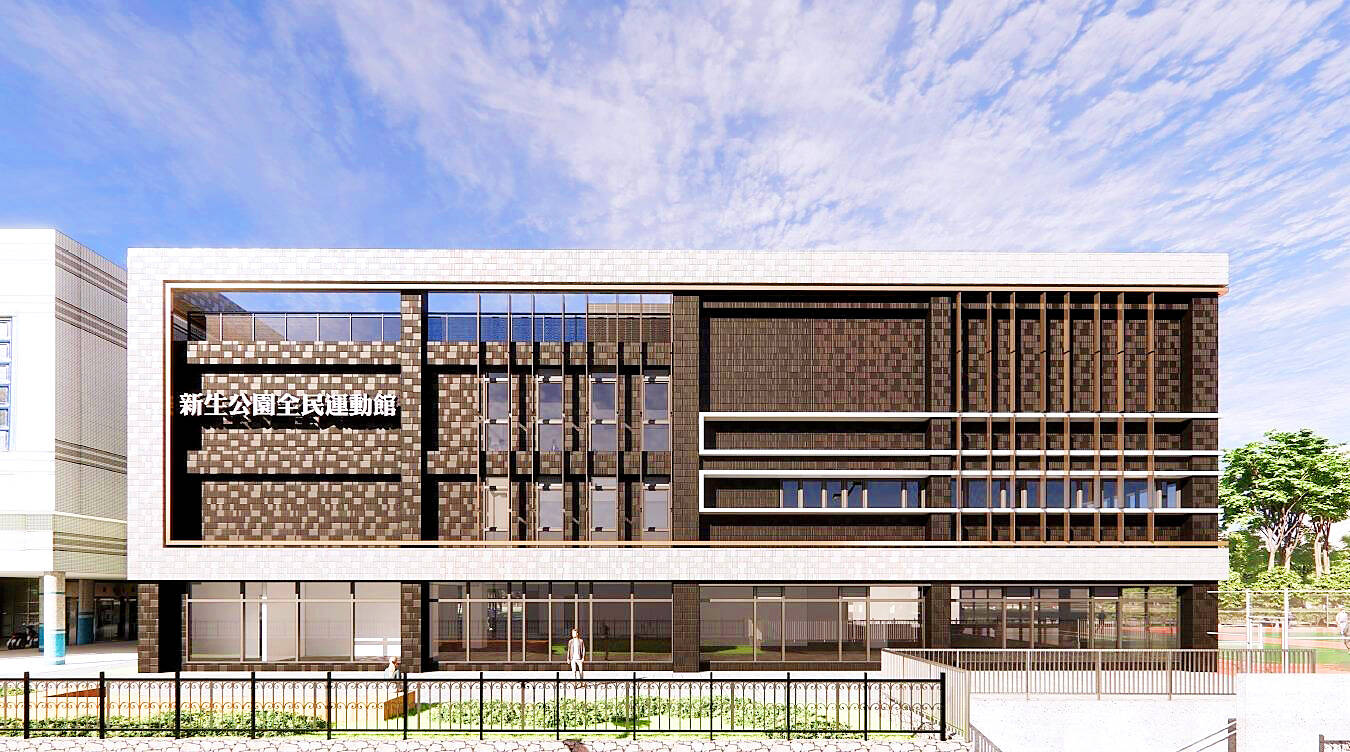Renovations of sports facilities in Taipei’s Shilin (士林) and Zhongshan (中山) districts are expected to be completed by 2026, as part of a municipal project to upgrade and expand the city’s community sports centers.
The Zhongshan Sports Center, which opened in 2003, was the first of its kind to be built in the nation. Seven years later, with the completion of the Wenshan District (文山) center in 2010, the city had achieved its aim of building a quality and affordable fitness center in all 12 districts.
More than 10 million people use the facilities each year, with average annual usage remaining high at 8 million during the pandemic.

Photo courtesy of the Taipei Department of Sports
As demand is high, lines are not uncommon, and it is often difficult to reserve facilities in advance, the Taipei Department of Sports said in a statement yesterday.
Popularity has also taken a toll on the facilities, which have over time become inadequate, it added.
The Taipei City Government is therefore implementing a “Sports Center 2.0” project to update and add to facilities across the capital.
The city is continuing to search for suitable sites, with the aim of creating smart and sustainable sporting facilities that cater to the particular needs of each district, it added.
Some renovations are under way in Shilin and Zhongshan, while plans have been drawn up for updating swimming pools in Beitou (北投), Nangang (南港) and Wanhua (萬華) districts, department Commissioner Wang Hung-shiang (王泓翔) said.
The swimming pool at Keqiang Park (克強公園) in Shilin is being remodeled to feature a children’s fitness center, and the tennis courts at Zhongshan’s Xinsheng Park (新生公園) are being remodeled for accessibility and to house the city’s first shooting range built to international standards, Wang said, adding that both are expected to be finished in 2026.
Upgrades to the swimming pools in Beitou’s Qihu Park (七虎公園), Nangang’s Yucheng Park (玉成公園) and Wanhua’s Youth Park (青年公園) are expected to be completed by 2030, he added.

Beijing could eventually see a full amphibious invasion of Taiwan as the only "prudent" way to bring about unification, the US Department of Defense said in a newly released annual report to Congress. The Pentagon's "Annual Report to Congress: Military and Security Developments Involving the People's Republic of China 2025," was in many ways similar to last year’s report but reorganized the analysis of the options China has to take over Taiwan. Generally, according to the report, Chinese leaders view the People's Liberation Army's (PLA) capabilities for a Taiwan campaign as improving, but they remain uncertain about its readiness to successfully seize

Taiwan is getting a day off on Christmas for the first time in 25 years. The change comes after opposition parties passed a law earlier this year to add or restore five public holidays, including Constitution Day, which falls on today, Dec. 25. The day marks the 1947 adoption of the constitution of the Republic of China, as the government in Taipei is formally known. Back then the Chinese Nationalist Party (KMT) governed China from Nanjing. When the KMT, now an opposition party in Taiwan, passed the legislation on holidays, it said that they would help “commemorate the history of national development.” That

Taiwan has overtaken South Korea this year in per capita income for the first time in 23 years, IMF data showed. Per capita income is a nation’s GDP divided by the total population, used to compare average wealth levels across countries. Taiwan also beat Japan this year on per capita income, after surpassing it for the first time last year, US magazine Newsweek reported yesterday. Across Asia, Taiwan ranked fourth for per capita income at US$37,827 this year due to sustained economic growth, the report said. In the top three spots were Singapore, Macau and Hong Kong, it said. South

Snow fell on Yushan (Jade Mountain, 玉山) yesterday morning as a continental cold air mass sent temperatures below freezing on Taiwan’s tallest peak, the Central Weather Administration (CWA) said. Snowflakes were seen on Yushan’s north peak from 6:28am to 6:38am, but they did not fully cover the ground and no accumulation was recorded, the CWA said. As of 7:42am, the lowest temperature recorded across Taiwan was minus-5.5°C at Yushan’s Fengkou observatory and minus-4.7°C at the Yushan observatory, CWA data showed. On Hehuanshan (合歡山) in Nantou County, a low of 1.3°C was recorded at 6:39pm, when ice pellets fell at Songsyue Lodge (松雪樓), a